Leave a Comment:
(0) comments
Add Your Reply

By Terry | anti Christian
Thomas Jefferson said, “Put not your faith in men, but bind them down with the chains of the Constitution.” Sounds great right? Let me ask you a simple question. Do you think our politicians and government have been bound down with the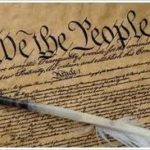 chains of the Constitution? Unless you are brain dead or walking around oblivious to your surroundings bathed in apathy, I think you have to honestly answer that question with a resounding- NO!
chains of the Constitution? Unless you are brain dead or walking around oblivious to your surroundings bathed in apathy, I think you have to honestly answer that question with a resounding- NO!
So, let me ask you another question, What do you really know about the men who framed our Constitution? Are you simply operating from the standard assumptions and stories we’ve all been taught? Do you believe you been given the whole picture and full truth?
The fact is, if you have any awareness of the state of our nation and where it is headed, you have to admit that the Constitutional promise of limited government is a HUGE disappointment. So, something has gone wrong as we have headed on down the trail of the Constitution. Let me suggest that the seeds of that track may be traced back to the framers themselves.
So, as buried as “we the people” are in debt and regulations, let’s dig a bit below the surface to see if we can uncover a few less highlighted facts about these framers to determine where we may have gone off track.
If we can move past the myths, we will get a more truthful picture of who these guys really were. In turn, we will have a more realistic understanding of the kind of emphasis you would expect from any document they produced. We can also gain some insight as to why this so-called limited government Constitution has dramatically failed to achieve its publicly accepted promise and purpose.
In the last post, I emphasized George Washington’s background because he was probably the most influential figure associated with the Constitution. Some historians even contend that he may have been the biggest reason the Constitution was ratified since he was so widely revered and favorably looked upon by the majority of the people at that time. If you missed that post go back and read it to capture a more realistic picture of who George Washington was beyond the myths.
In this post, I’d like to take a brief view of other important framers and a general summary of who these constructors of our current government actually were.
Let’s begin with the second most influential and known attendee at that time in the colonies, Benjamin Franklin
Benjamin Franklin was born in Boston, Massachusetts on January 17, 1706.While Franklin was brought up as a Christian by his parents, his inquisitive nature forced him to rebel against what he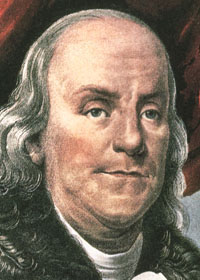 eventually decided were the irrational ideas of his Christian parents.
eventually decided were the irrational ideas of his Christian parents.
In his Autobiography, he discusses his skepticism:
[quote]“My parents had given me betimes religions impressions, and I received from my infancy a pious education in the principles of Calvinism. But scarcely was I arrived at fifteen years of age, when, after having doubted in turn of different tenets, according as I found them combated in the different books that I read, I began to doubt of Revelation itself….Some books against Deism fell into my hands. It happened that they wrought an effect on me quite contrary to what was intended by them; for the arguments of the Deists, which were quoted to be refuted, appeared to me much stronger than the refutations; in short, I soon became a thorough Deist.”[/quote]Franklin’s deist beliefs stayed with him for the remainder of his life. He never returned to Christianity. (Deists believe in a God created universe. They do not believe in Christ’s divinity nor the God of the bible and other accepted Christian beliefs. They tend to emphasize reason and works over faith as well.)
More clarity on Franklin’s hostility towards Christianity is revealed in his essay on “Toleration,”:
[quote]“If we look back into history for the character of the present sects in Christianity, we shall find few that have not in their turns been persecutors, and complainers of persecution. The primitive Christians thought persecution extremely wrong in the Pagans, but practiced it on one another. The first Protestants of the Church of England blamed persecution in the Romish church, but practiced it upon the Puritans. These found it wrong in the Bishops, but fell into the same practice themselves both here [England] and in New England.”[/quote]Dr. Priestley, an close personal friend of Franklin, had this to say about Franklin’s beliefs about Christianity in his autobiography:
[quote]“It is much to be lamented that a man of Franklin’s general good character and great influence should have been an unbeliever in Christianity, and also have done as much as he did to make others unbelievers” (Priestley’s Autobiography)[/quote]No one is certain about when Franklin was initiated into the St. John’s lodge in Philadelphia but it was likely around 1730 or 31 when he was in his mid 20’s in age. He remained a Mason for the rest of his life.
According to Freemason Information, a web based Masonic magazine:
[quote]Franklin was in no way a simple and ordinary member of the Masonic lodge. He was appointed as the Junior Grand Warden of the Provincial Grand Lodge in Pennsylvania in the year 1732 and as the Grand Master on June 24, 1734. In 1734, he also printed the first Masonic book in the United States. His Mason book was the publication of Anderson’s Constitutions. Franklin was quickly elected as secretary of St. Johns’ Lodge, and he held the position from 1735 until 1738. Franklin continued to be an active member of the fraternity, and he continued to be elected and appointed for many positions. In March of 1752, Benjamin Franklin was put onto a committee for the first Masonic building in the United States. The lodge was to be in Philadelphia, Pennsylvania.[/quote]Since he traveled abroad, Franklin carried his Masonic activities along with him specifically to England and France. In November of 1760 in London, he was entered into the Minutes during the Grand Lodge of England’s meeting in Crown & Anchor, London as the Provincial Grand Master. He was elected to this position in June of 1760.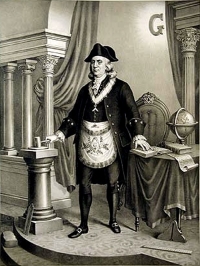
In France, he was affiliated with the La Loge des Neufs Soeurs or The Lodge of the Nine Sisters. He, in fact, assisted in its opening serving as the Grand Master of this lodge for 2 years. He also initiated the enlightenment leader Voltaire into Masonry in 1778 four months before Voltaire died at the age of 84. Voltaire had a great admiration for Franklin as they had much in common.
According to the Cyclopaedia of Universal History:
[quote]The aged Voltaire who in the last year of his life came in triumph to Paris grappled Franklin to himself as with hooks of steel. He placed his withered hands in benediction on the head of Franklin’s grandson as if to confer the philosophy and inspiration of the epoch on the third generation. The two great thinkers were taken together to the theater and at the close of the play were called upon the stage while the excited thousands cried out “Solon and Socrates.[/quote]In December 27, 1786, less than a year before the Philadelphia convention, Rev. Joseph Pilmore in St. Paul’s Church, Philadelphia referred to Franklin as “An illustrious Brother whose distinguished merit among Masons entitles him to their highest veneration” in the dedication of a sermon delivered at the request of the R. W. Grand Lodge of Pennsylvania.
Franklin died on April 17, 1790 a convicted Mason and Deist.
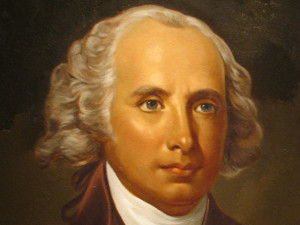 James Madison has been dubbed the “Father of the Constitution“. A title he rejected (perhaps rightfully so) but others insist on hanging on him because of his active engagement in its creation and ratification, as a delegate, speaker and writer promoting it.
James Madison has been dubbed the “Father of the Constitution“. A title he rejected (perhaps rightfully so) but others insist on hanging on him because of his active engagement in its creation and ratification, as a delegate, speaker and writer promoting it.
Madison had no conventional sense of Christianity. In 1785, Madison wrote in his Memorial and Remonstrance against Religious Assessments:
[quote]“During almost fifteen centuries has the legal establishment of Christianity been on trial. What have been its fruits? More or less in all places, pride and indolence in the Clergy, ignorance and servility in the laity; in both, superstition, bigotry and persecution.”[/quote] (Point 7) [quote]“What influence, in fact, have ecclesiastical establishments had on society? In some instances they have been seen to erect a spiritual tyranny on the ruins of the civil authority; on many instances they have been seen upholding the thrones of political tyranny; in no instance have they been the guardians of the liberties of the people. Rulers who wish to subvert the public liberty may have found an established clergy convenient auxiliaries. A just government, instituted to secure and perpetuate it, needs them not.”[/quote] (Point 8)Historian Robert Allen Rutland who wrote “James Madison: The Founding Father” points out that Madison had a dream of the creation of a secular republic and explicitly not a Christian republic.
Not long after the Annapolis Convention (pre-cursor to the Philadelphia convention) adjourned, Madison received a letter from George Washington on 11/5/1786 pleading for a new and stronger government, “The consequences of a lax, or inefficient government, are too obvious to be dwelt on.-Thirteen Sovereignties pulling against each other and all tugging the federal head, will soon bring ruin on the whole.”
It is said by some that Thomas Paine, author of Common Sense influenced more early Americans than any other writer in providing the basis for the thinking expressed towards a Revolution 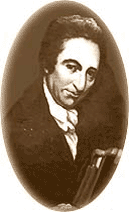 against England and in government.
against England and in government.
John Adams (Unitarian and anti-Christian reflected in his letters to Thomas Jefferson) quote appears on Paine’s gravestone: “Without the pen of Paine the sword of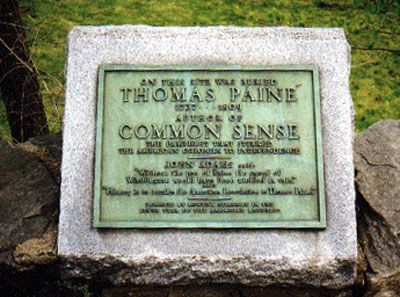 Washington would have been in vain.”
Washington would have been in vain.”
Paine, like Jefferson, Franklin and Washington, was a Deist. In his popular book, The Age of Reason he wrote:
“Of all the systems of religion that ever were invented, there is no more derogatory to the Almighty, more unedifying to man, more repugnant to reason, and more contradictory to itself than this thing called Christianity. “
On the Bible Paine wrote: [quote]“it is the fable of Jesus Christ, as told in the New Testament, and the will of visionary doctrine raised therein against which I contend…What is it the Testament teaches us? To believe that the Almighty committed debauchery with a woman engaged to be married…and the belief in this debauchery is all faith.”[/quote] [quote]“I do not believe in the creed professed by the Jewish church, by the Roman church, by the Greek church, by the Protestant church, nor by any church that I know of. My own mind is my church. “[/quote]
As an enlightenment thinker, Paine’s idol was reason. This philosophy is shared by all enlightenment thinkers and nearly the entire contingent of delegates at the Constitutional Convention in Philadelphia.
The delegates to the technically illegal meeting which covertly became a Constitutional convention were pretty much career politicians. They were in public office before the Convention. They pursued public office afterwards.
Few of them returned to a non-public life. Twenty seven of the 55 were future members of Congress. Two were future Presidents. One was a future Vice President. One became a Speaker of the House. Four became U.S. District Court judges and four were future Supreme Court judges. Virtually all of the rest who did not hold office after the Convention simply passed on to the great beyond, i.e. died.
Question: Do you think they may be inclined to emphasize a document that empowers government based on their backgrounds?
Additionally, as previously noted there was a goodly amount of former military officers and lawyers at the time of the convention.
Question: Do you think they might emphasize control of our decision to go to war through government with no input from the people?
Virtually all of them were considered very wealthy, wealthy or on their way back to wealth from having been formerly wealthy.
Question: Do you think there may be some trap doors to protect wealth built into this document?
With regards to religion, there was only one solid Christian, Richard Bassett of Maryland. The remainder were either Masons (non-Christian for reasons stated in my Washington post) Unitarians (like John Adams, our 2nd President), Deists (like Jefferson and Paine) or enlightenment inspired rationalists. In other words, pretty much a group of secularists and religious pluralists holding to the enlightenment focus on reason over faith and Christian beliefs.
Most certainly not the Christians we have been led to believe put together the Constitution. If anything, there was a decidedly anti-Christian bias in this group. In later posts, we’ll define how this was expressed in the Constitution itself.
Question: Do you think there may be an anti-Christian, pluralistic (all religions, beliefs are acceptable) emphasis when it comes to religion built into the Constitution?
All of these characteristics, i.e., committed politicians of wealth, legally oriented, non-Christian secularists and militarists had an impact on the document that emerged from these meetings held on the 2nd floor out of the public eye and without public input.
Revered as a miracle or Great Experiment with an intent to limit government, our Constitution has been transformed through the Supreme Court and our elected representatives to become a monster that intrudes into every part of our lives these days.
So, if the Constitution is the solution as “Constitutionalists” claim that it is, this Great Experiment has certainly massively failed to accomplish that goal.
The Federal Register is now 77,687 pages, not exactly a model of small government. We now have a regulatory climate that imposes an estimated $1.88 Trillion in lost economic productivity and higher prices according to the 2015 Ten Thousand Commandments report. This costs an average of $14,976 per household or around 29% of the family budget.
The Federal debt now stands at $18.9 Trillion, or over $58.000 per citizen and over $158,000 per taxpayer. Historically higher than any other nation in the history of the world prior to economic collapse. Hence, I still hold to my title for this series, the Constitution has proven not to be the solution. If it was it has failed to keeps its promises.
Next, we look at the Christian nature of the Constitution. Many insist it is, but based on what? It isn’t in the Constitution nor reflected as we’ve seen in the framers who attended the convention in Philadelphia. Are there any indications that it was the opposite? Stay with me and we’ll take a look.
A little warm up however. Ask yourself do you think that the Christian nature of our society has grown or retreated since the Constitution was ratified? Being honest, I think you will find the answer to that question is already clear. We’ll take a closer look at this issue next in Part Six.
New to the Series? Start at Part One.
YouTube/Google Censorship of Pro 2nd Amendment Videos
Do You Know What Is Really in the USMCA? Most Do Not
Can Donald Trump End Birthright Citizenship with an Executive Order?
Bye Bye Obamacare?
The Virginia Congressman Shooting- More Gun Control or Not?
Obama Delivers a Confused Message to Cubans
Reactions to the Oregon Standoff and the Shooting of LaVoy Finicum
Model Letter to Congressman Opposing the TPP